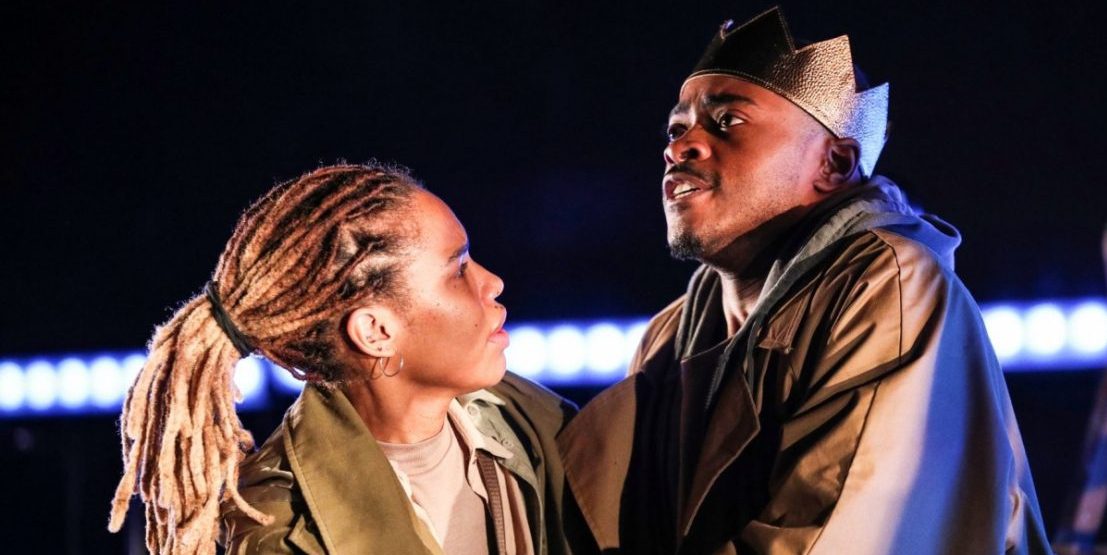‘Tangle’ is a touring company devoted to showcasing African and Caribbean excellence. This current tour, culminating in London this month, brings their collective talents to bear on Shakespeare’s ‘Richard II’, the first time that a cast from the African diaspora has performed this play. It takes rare insight and imagination to find something new to say about such a familiar play, and yet this production manages to do so in every department.
This starts with the script. Again, it is a brave director who adapts Shakespeare, but the fairly radical interventions by Anna Coombs are, dare I say it, an improvement. The gaggle of supporting historical characters is reduced in a way that clarifies and intensifies the family and political drama. By amalgamating a number of parts the role of Aumerle, in particular, emerges as an interesting counterpoint to his cousins, Bolingbroke and King Richard, offering a commentary on the distorting effect proximity to power has on character. With much of the religious material is made less prominent, the focus of the play rests very much on the dilemma of what can be done if a legitimate ruler is inadequate to the task of ruling, whether by incompetence or malign intent. How far and by what means can he be reasonably replaced without undermining belief in the system as a whole? This the fundamental question behind the whole of Shakespeare’s cycle of History plays, and the contemporary resonances in our own year of three prime ministers and two sovereigns are self-evident.
Richard manages to alienate and provoke his leading barons while not having the money or the power or savvy to subdue them, thus provoking his isolation, overthrow and ultimate murder. No one emerges with clean hands in the play, and moral ambiguity is cloaked in language of great lavishness, with extensive wordplay and rhetorical display, especially in the set-piece speeches accorded to Richard and John of Gaunt. This can be tiresome in traditional versions but here it sits well with the overall production concept, at once both austere and exceptionally sensitive to rhythm.
The set is very simple – an array of stepladders in varying sizes offering the actors different elevations and itself an oblique commentary on the perilous pathways to power. But there is also local detail when needed as, for example, in the allegorical gardeners’ scene where the apricots on the overgrown trees are represented by lightbulbs with an eerie fruit-like sheen. In addition, there are some subtle lighting effects and an excellent soundscape, the work of composer John Pfumojena. This offers both gentle underscore and stark African choral singing to cover scene changes, generate atmosphere, and accentuate the key points of some of the long speeches.
The actors themselves are very skilful and import a musical sense of line and rhythm which suits the elaborate, finely spun verse forms of the original. It is rare to hear Shakespeare spoken so well, with immaculate pointing, colouring and projection of the lines, particularly by Daniel Rock, the excellent King Richard. He captures the king’s delusions and pretensions but is also far more defiant and assertive than usual, before digging down to a deep revelation of self-knowledge in the final scenes.
All the other players have impressive moments, mostly doubling up roles. As Bolingbroke, Richard’s nemesis, Raheim Menzies is physically imposing and rhetorically impressive, making the most of the feisty, muscular and practical poetry that contrasts with Richard’s more elaborately decorative, image-laden material. Courtney Wilson finds some fresh nuances in the well-known elegy for England in the mouth of John of Gaunt, and a more Machiavellian manner for the crafty plotter, Northumberland. Lebogang Fisher plays Aumerle with the right blend of flattery to the shifting powers that be; and Sibusio Mamba is particularly successful with the role of York, trying to navigate and appease both sides with diminishing success – a very recognisable universal political type.
Though the evening is a long one, it is thoroughly compelling, and the comfortable ambience of the Omnibus Theatre makes this an excellent thought-provoking night out for anyone with a commitment to renewal of Shakespeare and debate of some of the perennial themes of politics in the hands of a cast of rare power.

